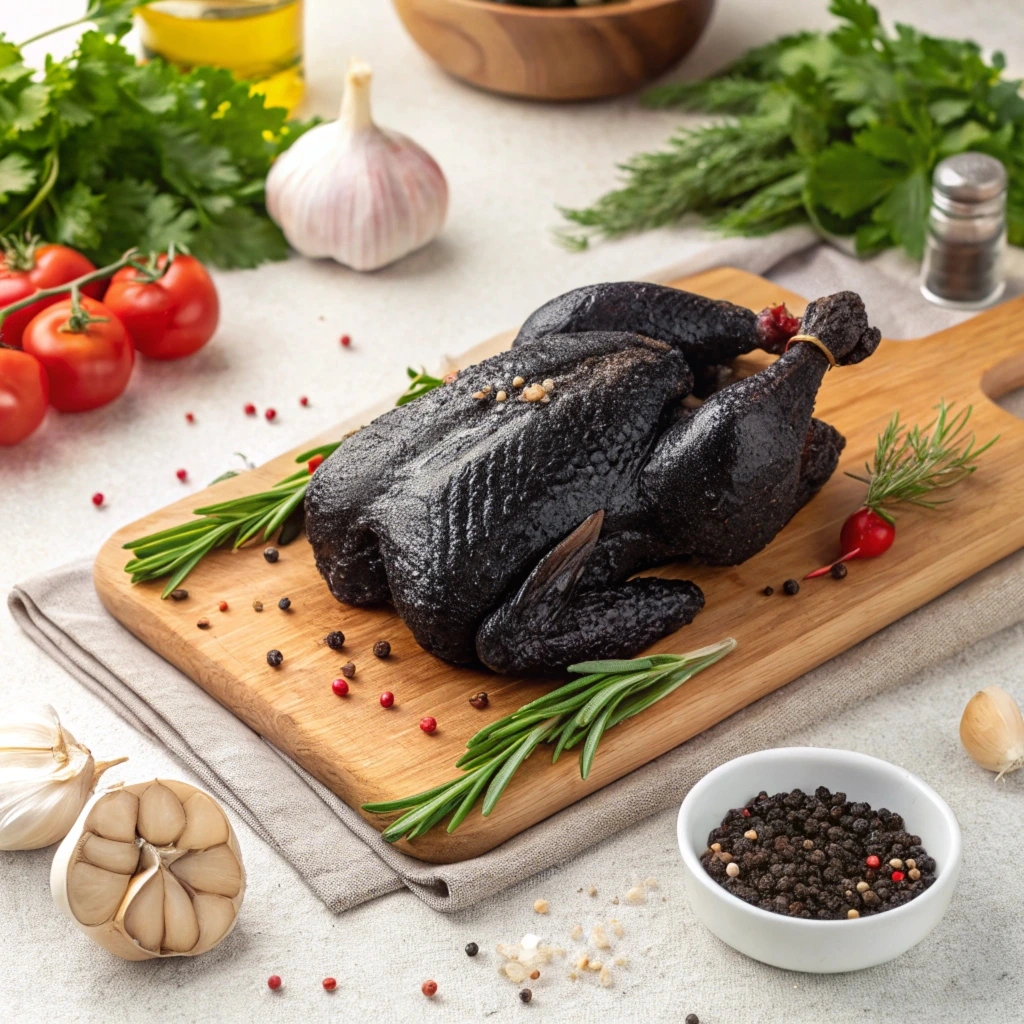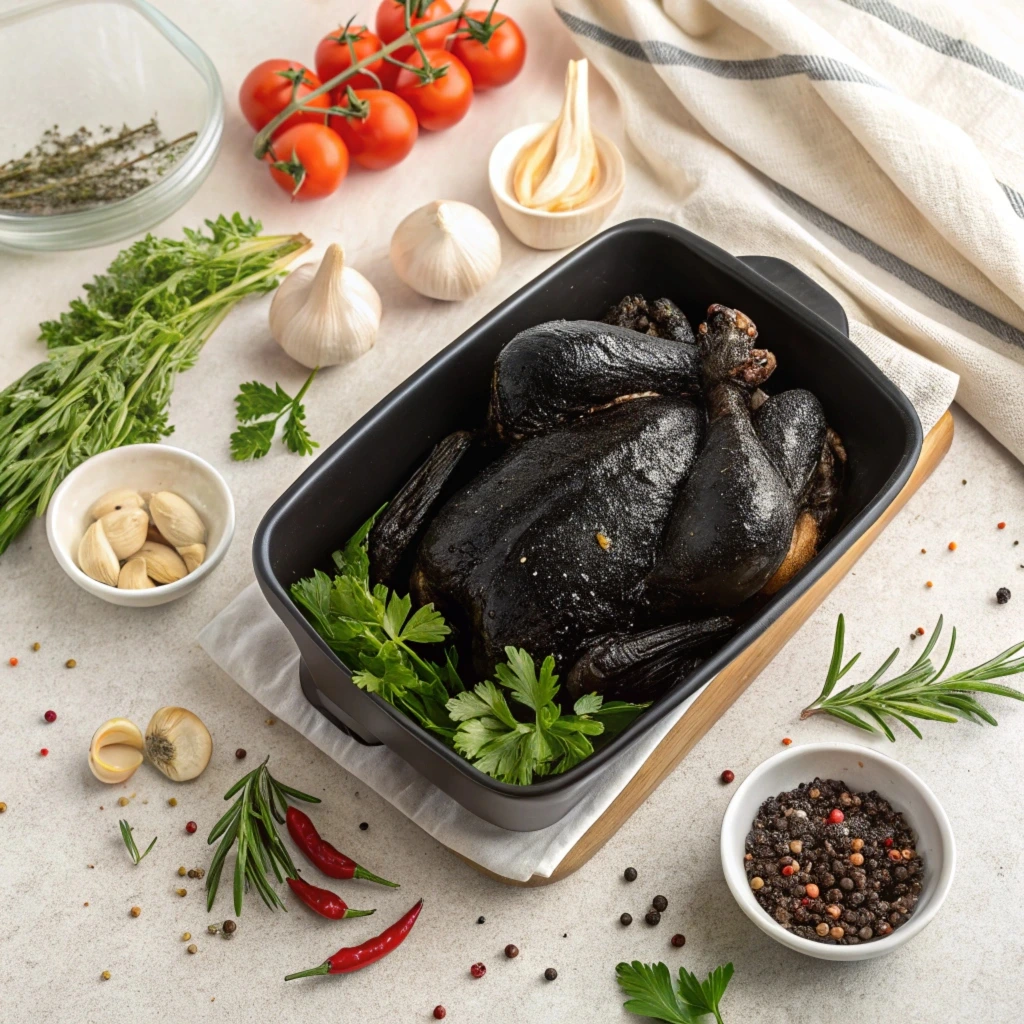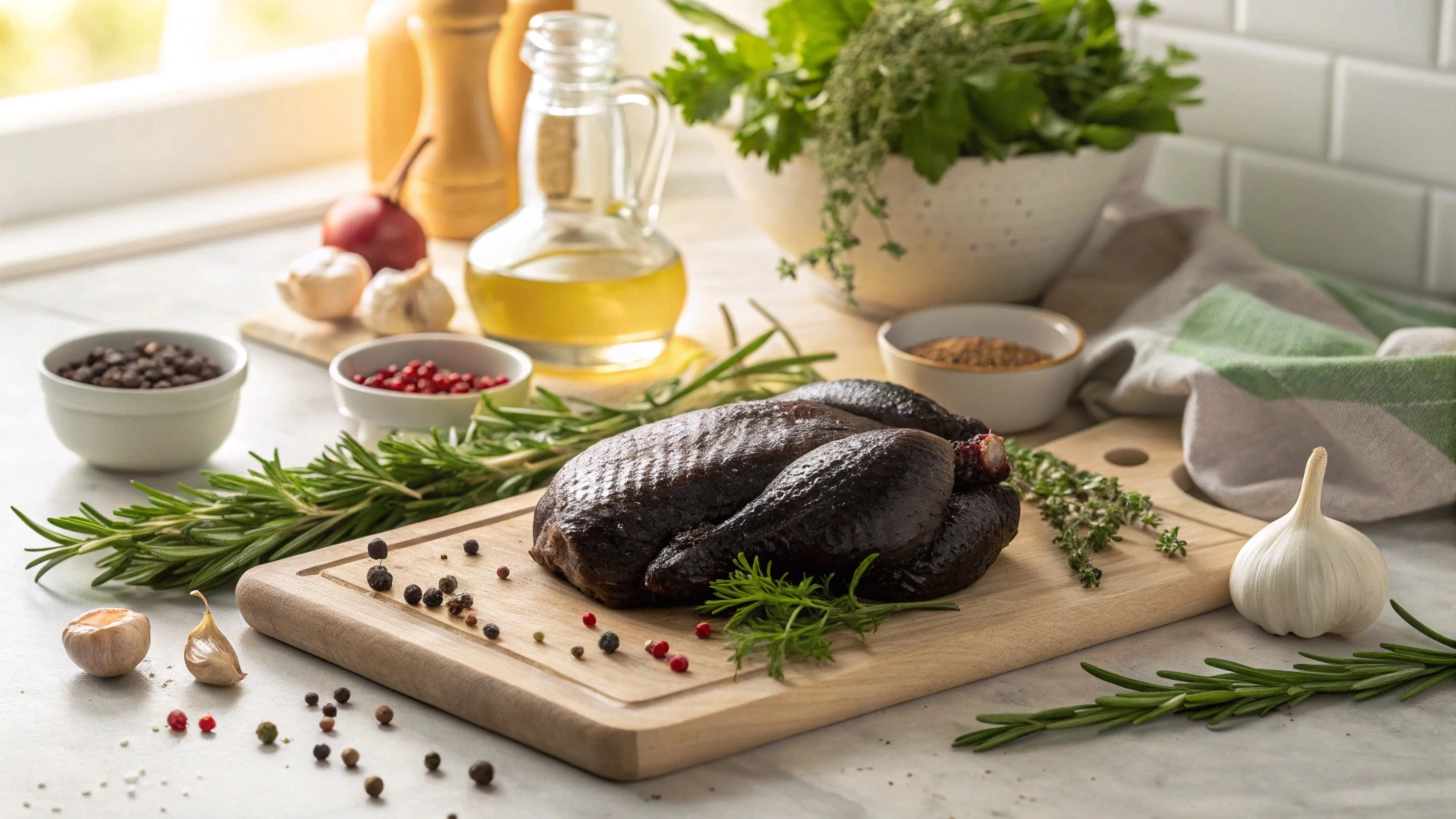Why Black Chicken Are Unique: Benefits and Recipes
Black chicken have captured the fascination of poultry enthusiasts, chefs, and health-conscious individuals alike. Known for their striking appearance and unique genetic traits, these birds stand apart from conventional chicken breeds. While they may appear mysterious, black chickens offer a host of culinary, cultural, and nutritional benefits that make them a valuable addition to kitchens and farms worldwide.
The allure of black chickens isn’t just skin-deep—these birds possess a dark, rich pigmentation that extends beyond their feathers, often including their skin, meat, and even internal organs. Varieties like the Ayam Cemani from Indonesia have earned nicknames such as “The Lamborghini of Chickens” due to their rarity and premium status. Beyond their striking appearance, black chickens play a significant role in traditional medicine and are prized for their high nutritional value.
In this article, we will explore the many dimensions of black chickens, from their genetic basis and cultural significance to their health benefits and culinary uses. Whether you’re considering raising black chickens or simply curious about their role in global cuisine, this guide will provide a comprehensive understanding of these extraordinary birds.
What Are Black Chickens?
Black chickens are a unique category of poultry breeds known for their extraordinary pigmentation. These birds stand out due to their dark feathers, which can range from glossy black to iridescent shades that shimmer with green or purple hues. However, their distinctiveness goes far deeper than their plumage. In some breeds, the pigmentation extends to their skin, bones, internal organs, and even meat, giving them an almost mythical quality.
Definition and History
The term “black chicken” refers to breeds with hyperpigmentation caused by a genetic condition called fibromelanosis. This trait is not found in ordinary chickens, making these breeds rare and highly sought after. Black chickens have been raised for centuries, particularly in regions of Asia, Africa, and Europe. Historical records show that black chickens were often associated with royalty, spirituality, and traditional medicine, adding to their allure.
Ayam Cemani: The Most Famous Black Chicken Breed
The Ayam Cemani is perhaps the most famous breed of black chicken. Originating from Indonesia, this breed is often called the “Goth Chicken” due to its jet-black feathers, skin, and meat. Ayam Cemani chickens are a symbol of wealth and prosperity in their native country and are considered sacred in certain rituals.
Their rarity and striking appearance have made them a luxury item in the poultry world. They are highly prized by breeders and can fetch a high price in international markets.
Other Popular Black Chicken Breeds
While the Ayam Cemani often steals the spotlight, other black chicken breeds deserve recognition.
- Silkie Chickens: Known for their fluffy, soft plumage, Silkies come in black varieties and are beloved for their gentle temperament.
- Kadaknath: Originating from India, the Kadaknath chicken shares many traits with the Ayam Cemani and is celebrated for its rich, dark meat and high protein content.
- Swedish Black Hen: A rare breed native to Sweden, this chicken shares the fibromelanosis trait but is slightly less intense in pigmentation compared to Ayam Cemani.
Genetic Basis for the Black Coloration
The unique black coloration in these chickens is caused by fibromelanosis, a genetic mutation that increases melanin production throughout their bodies. This mutation not only affects the feathers but also extends to their skin, bones, and connective tissues. While fibromelanosis is a natural genetic anomaly, it has been selectively bred into specific populations to create the stunning birds we see today.
Black Chicken Recipe: Nourishing Black Chicken Soup
Ingredients
- 1 whole black chicken (cut into pieces)
- 8 cups of water
- 3 slices of fresh ginger
- 4 dried red dates (jujube)
- 2 tablespoons goji berries (wolfberries)
- 1 ginseng root (optional, for additional medicinal benefits)
- 2 green onions (cut into large pieces)
- 1 tablespoon rice wine (optional)
- Salt to taste
- Pepper to taste
Instructions
Step 1: Prepare the Chicken
First, begin by washing the black chicken thoroughly under running water to ensure it is clean. Then, dry it with a clean towel and cut it into manageable pieces if it isn’t already pre-cut. This step is important because it ensures the chicken will cook evenly later on, giving you the best results.
Step 2: Blanch the Chicken
Next, place the chicken pieces in a large pot and pour in enough water to fully cover them. When the water starts to boil, allow the chicken to cook for 3–4 minutes to eliminate impurities. Then, drain the water and rinse the chicken with cold water. This additional rinse ensures the chicken is thoroughly clean and ready for the next step.
Step 3: Simmer the Soup
Now, take a fresh large pot and combine 8 cups of water with the blanched chicken pieces, ginger slices, dried red dates, goji berries, and ginseng root (if using). By adding these ingredients early, you allow their flavors to infuse deeply into the soup as it cooks. This step sets the stage for a flavorful and nourishing dish.
Step 4: Cook Slowly
After preparing the soup base, bring the pot to a boil over medium-high heat. After reaching a rolling boil, lower the heat and cover the pot. Let the soup simmer slowly for 1.5 to 2 hours. During this time, the chicken will become tender, and the flavors will blend perfectly, creating a rich and aromatic soup.
By following these steps carefully, you ensure each stage contributes to a delicious and wholesome black chicken soup.
Step 5: Season the Soup
After simmering, mix in the green onions, rice wine (if using), salt, and pepper. Let the soup simmer for an additional 10 minutes so the seasonings can fully meld with the other ingredients.
Step 6: Serve Hot
Finally, ladle the soup into individual bowls, ensuring each serving includes chicken pieces, dates, and goji berries. Serve the soup while it’s hot and enjoy its rich, comforting flavor.
By following these steps, you’ll create a delicious and nourishing black chicken soup perfect for any occasion!
Tips:
- For a clearer broth, skim off any foam or impurities that rise to the surface during simmering.
- Adding vegetables like carrots or mushrooms can enhance the flavor and nutritional profile of the soup.
This traditional black chicken soup is not only delicious but also packed with health benefits. It’s perfect for boosting immunity, restoring energy, or simply warming up on a chilly day. Enjoy!


Health Benefits of Black Chickens
Black chickens are not just unique in appearance—they are also incredibly nutritious. Their meat offers numerous health advantages, making it a great choice for anyone looking for a healthier alternative to regular chicken.
Nutritional Profile of Black Chicken Meat
| Nutrient | Benefit |
|---|---|
| High Protein | Builds and repairs muscles. |
| Low Fat | A healthier option for weight management. |
| Rich in Iron | Prevents anemia and boosts energy levels. |
| B Vitamins | Supports brain health and energy metabolism. |
Key Health Benefits
- Antioxidants:
- Black chicken meat is packed with antioxidants like carnosine, which reduces inflammation and slows aging.
- Heart Health:
- It has lower cholesterol levels than regular chicken, making it better for heart health.
- Nutrient-Dense:
- Black chicken meat offers more nutrients in smaller portions compared to other chicken.
Traditional Medicinal Uses
In traditional medicine, black chicken is used to promote better health:
- Immunity Boost: Black chicken soups, often cooked with herbs, are believed to strengthen the immune system.
- Energy Restoration: It is commonly used to fight fatigue and restore energy.
- Women’s Health: Postpartum women are often given black chicken soup for recovery.
Raising Black Chickens
Raising black chickens is an exciting and rewarding experience for poultry enthusiasts. These birds are not only visually striking but also known for their unique meat and eggs. Whether you’re a beginner or an experienced farmer, understanding their specific needs is key to raising healthy and productive black chickens.
Selecting the Right Black Chicken Breed
Different black chicken breeds have varying characteristics, so it’s important to choose the right one based on your goals:
| Breed | Best For | Special Features |
|---|---|---|
| Ayam Cemani | Rare breed collectors, luxury meat markets | Completely black, including skin and organs |
| Kadaknath | High-nutrition meat production | Rich in protein and low in fat |
| Silkie | Backyard pets, ornamental purposes, small farms | Soft, fluffy feathers and calm temperament |
| Swedish Black | Heritage breeding, small-scale farming | Hardy and adaptable to different climates |
Housing and Feeding Requirements
Proper housing and feeding are essential for raising healthy and productive black chickens. Meeting their specific needs ensures they thrive in your care.
Coop and Space
- Provide Sufficient Space: Allocate 3–4 square feet of space per chicken inside the coop. Additionally, ensure each bird has 8–10 square feet in the outdoor run. Adequate space helps reduce stress and promotes healthy behavior.
- Ensure Ventilation and Safety: Keep the coop well-ventilated to maintain fresh air flow and prevent respiratory issues. Secure the coop against predators using sturdy materials and locked doors.
Feeding
- Balanced Diet: Feed black chickens high-quality poultry feed with added protein to meet their nutritional needs. This is particularly important for breeds like Ayam Cemani and Kadaknath, which benefit from nutrient-rich diets.
- Supplements and Treats: Offer fresh greens, grains, and occasional protein-rich treats like mealworms to keep their diet varied and nutritious.
Water and Hygiene
- Provide Fresh Water: Always keep a clean supply of water available, as dehydration can affect their health and egg production.
- Maintain Cleanliness: Regularly clean the coop and replace bedding to prevent the spread of diseases and parasites. A clean environment is key to keeping your chickens healthy and happy.
By ensuring proper housing, nutrition, and hygiene, your black chickens will remain active, healthy, and productive.
Common Diseases and Their Prevention
Black chickens are generally hardy but can still be prone to common poultry illnesses. Here’s how to manage their health:
| Disease | Symptoms | Prevention |
|---|---|---|
| Coccidiosis | Diarrhea, lethargy | Keep the coop dry and clean; use medicated feed. |
| Marek’s Disease | Paralysis, weight loss | Vaccinate chicks early. |
| Respiratory Issues | Sneezing, wheezing | Ensure proper ventilation in the coop. |
Tips for Successful Raising
- Temperature Control:
- Black chickens, like Ayam Cemani and Kadaknath, prefer warmer climates. Provide heat lamps in colder seasons.
- Breeding Practices:
- Select healthy birds for breeding to maintain genetic traits like fibromelanosis (black pigmentation).
- Socializing:
- Black chickens are generally friendly and do well in small flocks.
Raising black chickens can be a fulfilling venture, offering both beauty and utility for farmers and enthusiasts alike.
Culinary Uses of Black Chickens
Black chickens are renowned for their unique flavor and versatility in cooking. Their rich, dark meat is not only visually distinctive but also packed with nutrients, making them a favorite ingredient in traditional and gourmet dishes around the world.
Popular Traditional Dishes
- Chinese Cuisine:
- Silkie Chicken Soup: A famous dish in Chinese medicine, this soup is made by simmering black chicken with herbs like ginseng, wolfberries, and jujube. It’s believed to boost immunity and energy.
- Braised Black Chicken: Slow-cooked with soy sauce, ginger, and garlic for a savory, hearty meal.
- Indian Cuisine:
- Kadaknath Curry: A spicy dish where Kadaknath chicken is cooked with a blend of aromatic spices.
- Tandoori Kadaknath: Marinated in yogurt and spices, then grilled to perfection for a smoky flavor.
- Korean Cuisine:
- Samgyetang: A nourishing ginseng chicken soup that occasionally uses black chicken for added richness.
Black Chicken in Gourmet Cooking
- Roasts and Grills: Chefs use black chickens for roasting and grilling, which enhance their dark meat’s rich flavor and natural tenderness. These methods also bring out the meat’s distinct, earthy taste.
- Fusion Dishes: To add a creative twist, black chicken is included in fusion dishes like salads, tacos, and pasta. Its unique appearance and taste make these recipes both visually appealing and delicious.
- Broths and Stews: Black chickens are perfect for making nutrient-packed broths and stews. Their deep flavor enriches soups and sauces, making them ideal for comforting, hearty meals.
Cooking Tips for Black Chicken
- Marination:
- Due to its dense meat, marinating black chicken overnight helps enhance flavor and tenderize the meat.
- Slow Cooking:
- Black chicken is best suited for slow-cooking methods, such as braising or simmering, to retain its moisture and unlock its deep flavor.
- Pairing with Herbs:
- Herbs like thyme, rosemary, and basil complement the earthy taste of black chicken.
Why Black Chicken Stands Out
The unique taste and texture of black chicken make it a versatile option for both traditional and innovative recipes. It adds a touch of luxury to meals, while its nutritional benefits make it a healthier alternative to regular chicken.
FAQs
What is the best way to cook black chicken?
The best way to cook black chicken is through slow-cooking methods like simmering, braising, or steaming. These methods help retain the meat’s moisture while unlocking its deep, rich flavor. For instance, popular dishes such as soups, stews, and curries showcase the chicken’s unique taste. Additionally, marinating the chicken beforehand enhances its taste and texture.
What does black chicken taste like?
In comparison to regular chicken, black chicken has a slightly richer and more gamey flavor. Its taste is earthy and robust, making it ideal for broths and dishes that require a strong base flavor. Despite its dark color, however, the flavor is not overpowering and blends well with various spices and herbs.
What is black chicken made of?
Essentially, black chicken is a breed of chicken with unique pigmentation caused by fibromelanosis, a genetic condition that affects their skin, bones, and sometimes their meat. Moreover, the meat itself is natural and packed with nutrients, including high protein, low fat, and essential vitamins and minerals.
Is black chicken OK to eat?
Yes, black chicken is completely safe to eat and is highly nutritious. In fact, it is often considered a superfood due to its high levels of protein, antioxidants, and low fat. Furthermore, many cultures use black chicken in traditional medicinal dishes to promote health and well-being.
Conclusion
Black chickens are extraordinary creatures that offer more than just a striking appearance. Their rich history, cultural significance, and nutritional benefits make them a unique addition to both farms and dining tables. Whether you are drawn to the rare Ayam Cemani, the nutritious Kadaknath, or the charming Silkie, these breeds provide value beyond their rarity.
From traditional soups in Asia to gourmet dishes in the West, black chicken meat has become a symbol of health and sophistication. It is packed with protein, low in fat, and rich in antioxidants, making it a healthy choice for diverse diets. Furthermore, raising black chickens can be a rewarding experience for farmers and enthusiasts alike, offering both economic and personal satisfaction.
In conclusion, black chickens are more than just a culinary or farming novelty—they are a testament to nature’s diversity and richness. Whether you’re savoring a black chicken dish or raising these birds in your backyard, they represent a rare and fascinating part of the poultry world.
PrintWhy Black Chicken Are Unique: Benefits and Recipes
Discover the unique benefits of black chicken, how to raise them, and delicious recipes that showcase their rich flavor and nutrition.
- Prep Time: 15 minutes
- Cook Time: 2 hours
- Total Time: 2 hours 15 minutes
- Yield: 4 servings 1x
- Category: Main Course
- Method: Simmering
- Cuisine: Asian
Ingredients
- 1 whole black chicken (cut into pieces)
- 8 cups water
- 3 slices fresh ginger
- 4 dried red dates (jujube)
- 2 tablespoons goji berries
- 1 ginseng root (optional)
- 2 green onions (cut into pieces)
- 1 tablespoon rice wine (optional)
- Salt and pepper to taste
Instructions
- Prepare the Chicken: Wash the chicken thoroughly and pat it dry. Cut it into smaller pieces if needed.
- Blanch the Chicken: Place the chicken in a pot, add enough water to cover, and boil for 3–4 minutes. Drain and rinse under cold water.
- Simmer the Soup: In a clean pot, combine 8 cups of water, chicken, ginger, dates, goji berries, and ginseng (if using).
- Cook Slowly: Bring the pot to a boil, then lower the heat and simmer for 1.5 to 2 hours.
- Season the Soup: Add green onions, rice wine (if using), salt, and pepper. Simmer for another 10 minutes.
- Serve: Ladle into bowls and enjoy hot.
Nutrition
- Serving Size: 1 bowl
- Calories: 250
- Sugar: 2g
- Sodium: 350mg
- Fat: 8g
- Saturated Fat: 3g
- Unsaturated Fat: 5g
- Trans Fat: 0g
- Carbohydrates: 6g
- Fiber: 1mg
- Protein: 35g
- Cholesterol: 85mg
Keywords: black chicken








